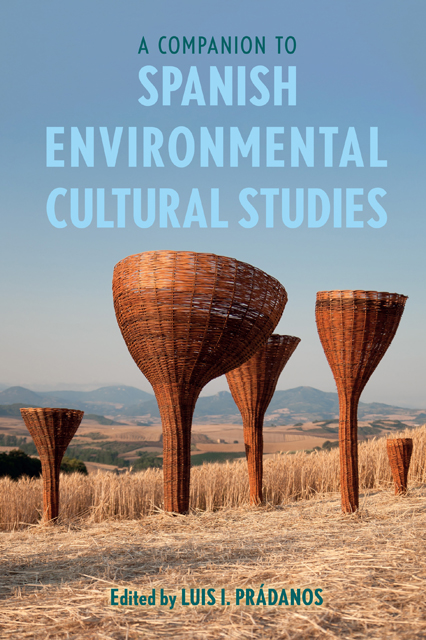Book contents
- Frontmatter
- Contents
- List of Illustrations
- List of Contributors
- Note on the Translations
- Acknowledgements
- Introduction: Spanish Environmental Cultural Studies
- Part I Environmental Cultural History and Political Ecology
- Part II Water and Power
- Part III Ecologies of Memory and Extractivism
- Part IV Animal Studies and Multispecies Ethnographies
- Part V Food Studies and Exploitative Ecologies
- Part VI Ecofeminism
- Part VII (Neo)Colonial and Racialized Ecologies
- Part VIII Tourism and the Environmental Imagination
- Part IX Eco-Mediation and Representation
- Part X Trash and Discard Studies
- Bibliography
- Index
24 - Aesthetics and the Political Ecology of Spanish Waste Space
Published online by Cambridge University Press: 08 June 2023
- Frontmatter
- Contents
- List of Illustrations
- List of Contributors
- Note on the Translations
- Acknowledgements
- Introduction: Spanish Environmental Cultural Studies
- Part I Environmental Cultural History and Political Ecology
- Part II Water and Power
- Part III Ecologies of Memory and Extractivism
- Part IV Animal Studies and Multispecies Ethnographies
- Part V Food Studies and Exploitative Ecologies
- Part VI Ecofeminism
- Part VII (Neo)Colonial and Racialized Ecologies
- Part VIII Tourism and the Environmental Imagination
- Part IX Eco-Mediation and Representation
- Part X Trash and Discard Studies
- Bibliography
- Index
Summary
Across an array of disciplines – history, language and cultural studies, politics, anthropology – scholars have devoted attention to explaining how the growth and consolidation of consumer capitalism has become the dominant political and economic mode governing modern human life. Scholarly consensus has converged around the idea that, in order to understand how modern democracies work, the governing modes of economic culture that underpin them must be part of the picture. As university courses on “The History of Capitalism” proliferate throughout the Anglophone academy, there has emerged a corresponding interest in understanding the legacy of industrial modernity in terms of the things it leaves behind: its detritus. Books by Gay Hawkins, Susan Strasser, John Scanlan, and Maite Zubiaurre have analyzed rubbish from a variety of disciplinary perspectives, while feature films and documentaries have sought, through a progressive lens, to make visible what Gay Hawkins has called the “shit end of capitalism.” The Spanish documentary filmmaker Víctor Moreno has produced two films – Edificio España (2012) and La ciudad oculta (2018) – which investigate, through a critical lens, the metabolism of Spanish urban modernity and its mainly hidden spatial contours. In a similar key, Mercedes Álvarez’s documentaries El cielo gira (2004) and Mercado de futuros (2011) explore the spatial and temporal logics of a Spanish modernity that has been all too eager to relegate the past to the national wastebin.
As an unstable, relational category, “waste has impacts across multiple scales, linking diverse actors and processes.” In the field of Marxian cultural geography there is an ample and extremely useful bibliography on how urban and exurban space has been shaped by the forces of market capitalism to reproduce itself. In Spanish Studies, Compitello, Fraser, Vilaseca and others have outlined the various ways in which Spanish urban space has been progressively colonized by capital. Henri Lefebvre points to the shift occurring mainly during nineteenth-century industrialization wherein the metropolis was progressively transformed into use value, which meant that urban space was absorbed and incorporated into the market economy. Benjamin Fraser puts it succinctly when he notes that, since the nineteenth century, the Spanish city has become yet another product to sell as urban landscapes have been transformed into vehicles for financial speculation (p. 263).
- Type
- Chapter
- Information
- A Companion to Spanish Environmental Cultural Studies , pp. 254 - 262Publisher: Boydell & BrewerPrint publication year: 2023



